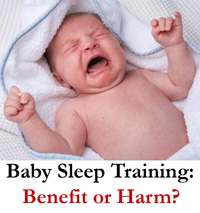Establishing healthy sleep habits for your baby has many potential benefits, the most immediate of which is more sleep for the both of you at night. No one’s disputing the idea that a baby sleeping through the night (at the appropriate age) is a good thing. It’s just that getting there can be emotionally taxing on both the baby and the parents.
Beneficial or Harmful?
Some parents worry that baby sleep training techniques — especially those where some crying may be involved — might have emotional or physical consequences on the baby, the parents, or their relationship. Most of these concerns originated with pure extinction methods, better known as cry-it-out (CIO). This method “is not usually recommended nowadays because of the distress it causes parents and infants.”
However, the concerns were extended even to current best practices for baby sleep training.
The focus of the debate seems to be the possibility of long-term harms from baby sleep training, but less attention has been paid to the potential long-term benefits it offers. It’s quite possible that there are benefits to both maternal and child health that may extend well beyond the 3-year follow-up.
The Infant Sleep Study
Now the benefits and harms of baby sleep training have been evaluated in a scientific setting. A new study in the top journal Pediatrics performed a randomized research trial to evaluate the long-term benefits, and possible harm, of baby sleep training intervention. The background information on the study is both sobering:
- 45% of mothers report sleep problems for babies between the ages of 6 and 12 months
- Infant sleep problems double the risk of maternal depression symptoms
- Sleep-related health issues are costly to families and healthcare systems
Baby Sleep Training Techniques
The good news is that most infant sleep problems, as the authors put it, “are readily treatable.” For babies 6 months of age and older, proven sleep training techniques such as controlled comforting help infants learn to self-soothe and to sleep independently. From 2003 to 2005, Hiscock and colleagues conducted the Infant Sleep Study, an effort to improve infant sleep problems at age 8-10 months. It was a large, community-based trial emphasizing positive bedtime routines and one of two baby sleep training techniques:
- Controlled comforting, in which parents respond to their infant’s crying at longer and longer intervals. This teaches the baby to self-soothe gradually, rather than going cold turkey with cry-it-out.
- Camping out, in which a parent sits with the child as they learn to fall asleep independently, and slowly removes herself or himself from the room.
And baby sleep training is effective.A systematic survey of behavioral intervention for baby sleep problems found that:
- 49 of 52 programs (94.2%) were successful, measured as clinically significant reductions in bedtime resistance and night waking 3 to 6 months later.
- Sleep training had numerous clear secondary benefits, including better parent sleep, mental health, and child-parent relationships.
- No studies found evidence of detrimental effects, including follow-ups as long as 3 years later.
The results of the study were compelling: parents who did intervention reported fewer sleep problems at age 10 months, and the mothers were less likely to have suffered depression at 2 years. In other words, sleep training was clearly effective in both establishing healthy sleep habits and preserving mom’s mental health.
Long-term Effects
As a follow-up to their study, the authors went back in 2009 when the infants were 6 years of age. They looked to see if there was evidence of intervention versus control group families in:
- Child emotional and conduct behavior
- Sleep patterns, stress levels, and psychosocial functioning
- Child-parent relationships, closeness, and attachment
- Maternal mental health in terms of depression, anxiety, and stress
